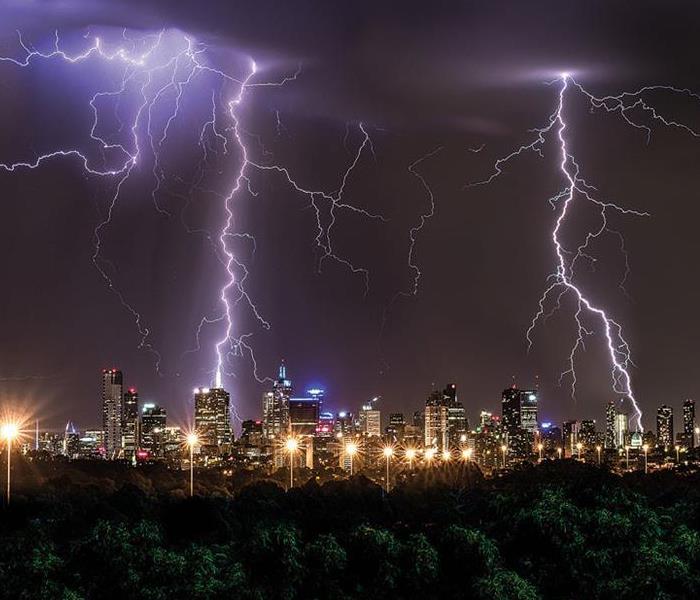Severe Storm Preparedness for the Atlantic City Area
7/31/2018 (Permalink)
 Be Prepared the Next TIme a Storm Rolls Through
Be Prepared the Next TIme a Storm Rolls Through
Follow These Red-Cross Approved Guidelines to Stay Safe During Severe Thunderstorms
Be Prepared:
- Learn about your local community’s emergency warning system for severe thunderstorms
- Discuss thunderstorm safety and lightning safety with all members of your household
- Pick a safe place in your home for household members to gather during a thunderstorm This should be away from windows, skylights and glass doors that could be broken by strong winds or hail
- Make a list of items to bring inside in the event of a severe thunderstorm
- Make trees and shrubbery more wind resistant by keeping them trimmed and removing damaged branches
- Protect your animals by ensuring that any outside buildings that house them are protected in the same way as your home
- Consult your local fire department if you are considering installing lightning rods
- Get trained in first aid and learn how to respond to emergencies
- Put together an emergency preparedness kit
- Review the Be Red Cross Ready - Thunderstorm Safety Checklist
During a Thunderstorm
- Listen to local news or NOAA Weather Radio for emergency updates. Watch for signs of a storm, like darkening skies, lightning flashes or increasing wind.
- Postpone outdoor activities if thunderstorms are likely to occur. Many people struck by lightning are not in the area where rain is occurring.
- If a severe thunderstorm warning is issued, take shelter in a substantial building or in a vehicle with the windows closed. Get out of mobile homes that can blow over in high winds.
- If you can hear thunder, you are close enough to be in danger from lightning. If thunder roars, go indoors! The National Weather Service recommends staying inside for at least 30 minutes after the last thunderclap.
- Avoid electrical equipment and telephones. Use battery-powered TVs and radios instead.
- Shutter windows and close outside doors securely. Keep away from windows.
- Do not take a bath, shower or use plumbing.
- If you are driving, try to safely exit the roadway and park. Stay in the vehicle and turn on the emergency flashers until the heavy rain ends. Avoid touching metal or other surfaces that conduct electricity in and outside the vehicle.
- If you are outside and cannot reach a safe building, avoid high ground; water; tall, isolated trees; and metal objects such as fences or bleachers. Picnic shelters, dugouts, and sheds are NOT safe.
After a Thunderstorm
Take the Appropriate Steps to Stay Safe
- Never drive through a flooded roadway. You cannot predict how deep the water may be.
- Stay away from storm-damaged areas to keep from putting yourself at risk from the effects of severe thunderstorms.
- Continue to listen to a NOAA Weather Radio or to local radio and television stations for updated information or instructions, as access to roads or some parts of the community may be blocked.
- Help people who may require special assistance, such as infants, children and the elderly or disabled.
- Stay away from downed power lines and report them immediately.
- Watch your animals closely. Keep them under your direct control.
If Lightning Strikes
Follow these steps if someone has been struck by lightning:
- Call for help. Call 9-1-1 or the local emergency number. Anyone who has sustained a lightning strike requires professional medical care.
- Check the person for burns and other injuries. If the person has stopped breathing, call 9-1-1 and begin CPR. If the person is breathing normally, look for other possible injuries and care for them as necessary. People who have been struck by lightning do not retain an electrical charge and can be handled safely.
Let Your Family Know You're Safe
If your community has experienced a disaster, register on the American Red Cross Safe and Well website to let your family and friends know you are safe. You may also call 1-866-GET-INFO to register yourself and your family. Resources to Handle Floods and Storms
When storms hit Atlantic City we can scale our resources to handle a large storm or flooding disaster. We can access equipment and personnel from a network of 1,650 Franchises across the country and elite Disaster Recovery Teams that are strategically located throughout the United States.
Have Storm or Flood Damage? Call Us Today (609) 965-0885





 24/7 Emergency Service
24/7 Emergency Service
